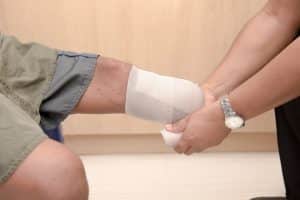Understanding Your Legal Options After an Amputation Injury
 Amputations, the surgical removal or traumatic severing of a limb or a part of a limb, can result from a wide range of causes. Traumatic events are one of the more common reasons.
Amputations, the surgical removal or traumatic severing of a limb or a part of a limb, can result from a wide range of causes. Traumatic events are one of the more common reasons.
Accidents, whether on the road, at the workplace, or in public spaces, sometimes lead to devastating amputation injuries. These life-altering incidents can occur during accidents when we least expect them, leaving individuals facing the challenging reality of amputation. In the case of car accidents, amputations often occur as a result of head-on collisions, particularly when excessive speed is involved.
If you find yourself in a situation where you’ve suffered an amputation due to an accident in Minot that was not your fault, you may have a potential legal avenue to pursue. The reason is simple: when someone’s negligence or wrongful actions result in harm to others, they should be held accountable.
Different types of amputation
Not all amputations are the same, and knowing the difference between partial and total amputations helps make clear the extent of the injury a victim has sustained.
Partial amputation
Partial amputation refers to the loss of a portion of a limb where part of the limb remains intact. In simpler terms, it means that not the entire limb is removed, but a significant part is affected. This can be a distressing experience, as it can still result in substantial changes to one’s life and daily activities. Partial amputations can occur due to various incidents, including workplace accidents, industrial mishaps, or even car crashes, especially when seatbelts or airbags malfunction.
Medically, partial amputations require immediate attention and often involve extensive surgeries to preserve as much of the limb as possible. Recovery may include physical therapy and rehabilitation to regain function, which can be a long and grueling process.
Total amputation
Total amputation refers to the complete removal of a limb or a part of a limb, leaving no residual attachment. Simply put, it signifies the loss of an entire limb or an entire part of it, which can have profound physical and emotional implications for an individual. Total amputations often result from severe accidents, such as industrial mishaps, heavy machinery incidents, or catastrophic car crashes.
A total amputation requires immediate medical attention, extensive surgical procedures, and ongoing rehabilitation. The road to recovery can be long and challenging, involving physical therapy and emotional support.
Pursuing compensation for damages related to an amputation injury
When pursuing a legal case following an amputation injury, there are various damages for which you can seek compensation. These damages typically fall into two main categories: economic and non-economic. Economic damages encompass tangible, quantifiable losses, such as:
- Medical expenses
- Rehabilitation costs
- Lost wages
- Future earning potential
These costs can be substantial, given the long-term medical and financial implications of amputation injuries.
On the other hand, non-economic damages account for the intangible aspects of the injury, including:
- Pain and suffering
- Emotional distress
- Overall reduction in quality of life
By pursuing a legal case in Minot, you aim to recover these damages, helping to alleviate the financial and emotional hardships caused by the amputation, and providing a path toward recovery and rehabilitation.
The impacts on daily life are exceptional
Amputations are catastrophic injuries. Whether partial or total, they create a set of physical challenges that can significantly alter a victim’s daily life. Tasks once taken for granted, such as dressing, cooking, or even walking, may now require creative adaptations. In Minot, like in many other places, amputees may find themselves navigating a world where accessibility and mobility can pose unexpected hurdles. However, with resilience and the right support and advanced prosthetics, many individuals successfully adapt to their new circumstances, learning new ways to accomplish daily tasks and regain independence.
The emotional and psychological impact of amputation cannot be understated. It’s natural to experience a range of emotions, from shock and grief to frustration and anxiety. Coping with the loss of a limb often involves a journey of adjustment and self-discovery. Mental health support is crucial during this period, as it can help individuals work through their feelings, build resilience, and develop strategies for managing the emotional challenges that arise.
Lastly, the way an accident victim interacts with family, friends, and their community can undergo significant changes. Adjusting to the social dynamics may involve addressing questions, misconceptions, or prejudices that can arise. On a personal level, accepting the new normal and finding a sense of identity and purpose can be a profound and ongoing process.
While all of these impacts can be manageable, they don’t come without a cost. The expenses associated with amputations can place a significant financial burden on individuals and their families, making it even more crucial to explore legal avenues for potential compensation and financial relief.
Responsible parties need to be held accountable
In the pursuit of justice after an amputation injury, the first step is to determine who is at fault. This involves a careful examination of the circumstances surrounding the accident to establish liability. Identifying the responsible party is essential for moving forward with a legal case of this magnitude.
Advocating for your rights is a critical component of the process. It means standing up for yourself and ensuring that the negligent party takes responsibility for their actions and the negative impact they’ve had on your life. Legal action serves as a means to advocate for justice and fairness in the face of life-altering amputation injuries.
If you were injured in an accident that left you with an amputation injury, the skilled attorneys at Larson Law can help. Amputations require an experienced legal team to navigate the complexities of establishing liability and seeking fair compensation, all while providing you with the support and guidance needed during this challenging journey toward recovery and justice. Get in touch with us today to schedule a free consultation by calling our offices or completing our contact form. We handle injury cases on a contingency fee basis. We have offices in Fargo, Bismarck, and Minot.

Mark Larson is a Certified Civil Trial Specialist and Certified Civil Pre-Trial Specialist focusing on personal injury, car accidents, wrongful death, and oil field claims. Since 1979, Larson Law has served the injured throughout North Dakota. Read more about Mark V. Larson.
